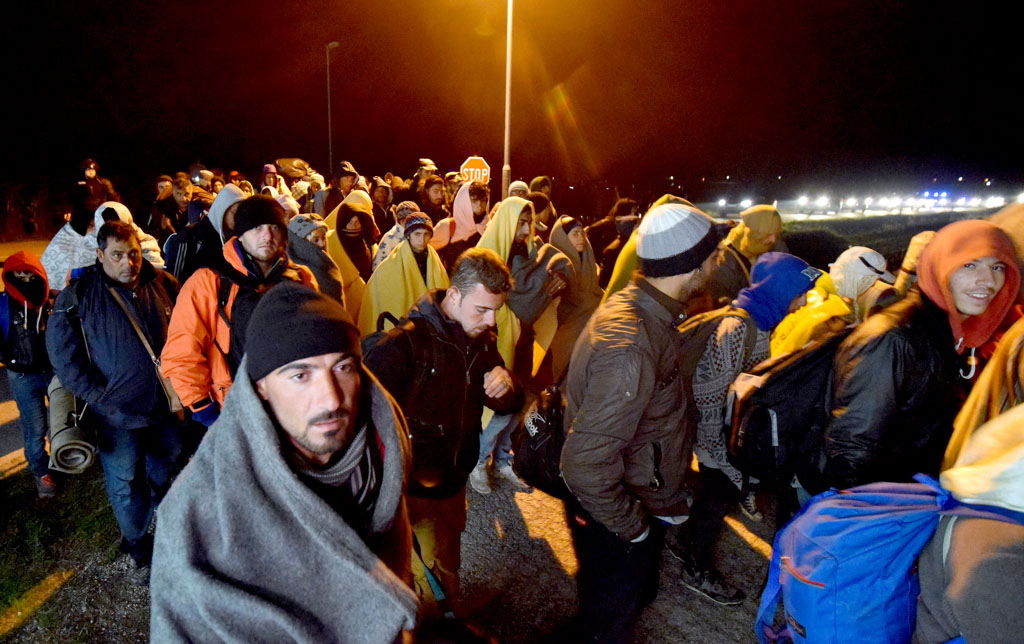By: L.K.F.
Between just under 10,000 and more than 300,000 euros per municipality, the government last year reimbursed 32 Slovenian municipalities along the Schengen border, a total of 2.76 million euros. Because of the illegal crossings of migrants and the consequent increased control of this border, they had additional costs for road maintenance, lighting, additional technical barriers, etc. This year, however, the government will distribute 2.5 million euros, which is an additional million more than it initially decided.
The government is aware that intensive control of the state border has led to an increase in the use of municipal infrastructure for several years, which is essential for the maintenance of further use. Therefore, already in 2020 and 2021, it allocated some money to these municipalities to cover part of the costs for the reconstruction of damaged infrastructure and costs related to ensuring the safety of the population (installation of additional lighting sources, technical means) and thus better quality of life and maintaining population in municipalities along the external Schengen border. “Given that the government started helping these municipalities only last year, and the additional burden on infrastructure by the police and the army has been going on for several years, this decision provides additional financial assistance to municipalities along the external Schengen border to rehabilitate infrastructure,” they wrote in the proposal to amend the decision adopted in June this year.
As Sabina Langus Boc, responsible for public relations at the Ministry of the Interior, explained to us, “this is a one-time reimbursement of costs in 2021, which is made on the basis of submitted invoices and justification of intended use and other documentary evidence. The mayors of the municipalities along the external Schengen border submit them to the Ministry of the Interior by November 30th, 2021. Therefore, the payments have not yet been made.”
In 2020, the Municipality of Ilirska Bistrica received the most money (302,229 euros), followed by the municipalities of Črnomelj (272,510 euros), Metlika (212,972 euros), and Kostel with 180,000 euros as well as Koper with just under 170,000 euros. Other municipalities – Brežice, Lendava, Rogatec, Osilnica, Kočevje, Ormož, Piran, Novo Mesto, Loški Potok, Zavrč, Razkrižje, Podčetrtek, Loška dolina, Središče ob Dravi, Bistrica ob Sotli, Krško, Šentjernej, Rogaška Slatina, Cirkulane, Hrpelje-Kozina, Kostanjevica na Krki, Žetale, Ljutomer, Videm, Podlehnik, Črenšovci, Gorišnica – received less than 100,000 euros in aid.
Illegal border crossings in numbers
In 2019, the Police dealt with 16,259 illegal border crossings, among the most frequently dealt were citizens of Pakistan, Algeria and Afghanistan. 11,164 foreign nationals were returned to foreign security authorities.
In 2020, 14,634 illegal border crossings were dealt with, most of them Pakistanis, Afghans and Moroccans. 10,024 foreign nationals were returned.
By November 21st, this year, police had recorded 8,803 illegal crossings, with citizens of Afghanistan, Pakistan and Bangladesh being among the most frequently dealt with. 3664 foreign nationals were returned to foreign security authorities.
When asked how many (in percentage) special/additional units, police officers or resources had to be engaged in the last three years to protect the Schengen border and what this means for the operation of the Police, Drago Menegalija, public relations representative for crime, says that the Police is assisted in the wider protection of the border by members of the Slovenian Army. In addition, the police deploy to the busiest parts of the external border a specialised unit for the control of the state border and members of the special police unit, and assistance is also provided by the air unit of the police with helicopters, and drones are also used for border control. “In the last three years, the police have hired 66 police officers – state border guards – to carry out Schengen border protection tasks,” he added. And that from May to November 2021, 199 police officers from foreign security agencies participated in the protection of the Schengen border on the basis of cooperation with some EU Member States.
So, do they have a staff shortage in the police in other areas and how do they solve it? “Given the urgency of security challenges, we are assisting ourselves with temporary staffing and referrals to ensure the proper operation of police units, and we are also continuing with an active employment policy. Thus, at the beginning of next year, a public announcement is planned for the eighth generation of candidates for police officers, who will be educated according to the post-secondary study programme for acquiring the profession of police officer. A public announcement is also planned for a group of candidates for police officers who will be trained according to the training programme for the implementation of state border tasks and for the protection of facilities,” said Drago Menegalija.
